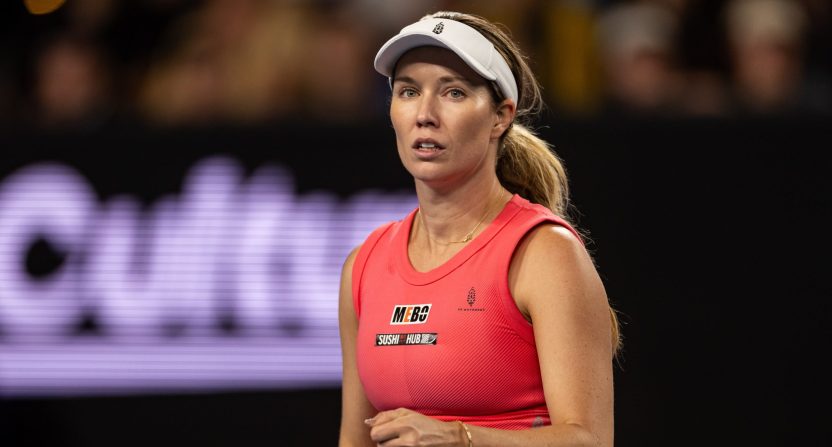American tennis star Danielle Collins has issued a response to an incident that happened at last week’s WTA event in Strasbourg, France, regarding a cameraman she believed was violating her and her opponent’s personal space.
Collins, who advanced to the second round of the French Open on Monday, was asked in a press conference following her win about comments she directed towards a camera operator in Strasbourg last week.
“I need to get water. We’re on a changeover. You don’t need to be that close to me and you don’t need to be on top of Emma [Raducanu]. It’s, like, wildly inappropriate. It’s not that difficult to make space,” Collins told the cameraman as she was filmed refilling her water bottle during a changeover during last week’s Round of 16 match against Raducanu.
When addressing the situation to the press at Roland Garros, Collins defended the right for herself and other women’s tennis players to be given appropriate space during competition. (Transcription via The Tennis Letter.)
“Yeah, I think those are two separate issues. I think what happened in Strasbourg is just me asking for personal space at my work place. I don’t know why that is even a topic of discussion. It should be something that we can get to have during, like, our work. The fact that I’ve had to ask so many different times in my career and during different matches to just have an adequate level of personal space is kind of strange. I think often times it seems like my response is treated like the offense itself.
“I’m learning that as a female, asking for personal space seems to be an issue for a lot of people. I think it’s really pathetic honestly, that it’s even a topic of discussion. It’s something that over time… there’s been no one that’s been able to make the adjustment.
“In the video, there’s so much people don’t see. They don’t see the person go and stand right on top of Emma to get a good shot of me in about a two to three-foot space. I’m doing a performance job. I’m trying to focus on my work. I’m trying to maintain my focus and concentration. My job requires channeling physical, emotional, and then logical things going on. It’s my job to kind of put that all together. The last thing I should be focusing on is someone that’s right on top of my opponent and right in my face.
“It’s just really unnecessary. Especially with the capability we have with technology. I feel like we can get a good shot and maybe like have a little bit more distance between each other. But to go off of what you’re saying, I think the other thing is a separate issue. I think that man was trying to do his job, but where do you draw the line? I don’t necessarily think it was creepy. But I think we should all be able to say, like, ‘Hey. I would like some physical space.’ You go to different tournaments and you ask nicely most of the time. You ask politely. That doesn’t get reported on. But the time I get upset about at it, that response is treated as the offense itself. And that’s what I find most interesting about it.”
There is certainly a distinction between what is acceptable and professional behavior and what crosses the line into inappropriate behavior when it comes to documenting professional athletes in competition.
On the one hand, as Collins mentions, being a professional tennis player is “a performance job.” There is an expectation that nothing you do on the court is private. Everything that happens on the court is to produce an entertainment product for public consumption. This is part of the gig if you’re a professional athlete. Like it or not, there are going to be cameras in your face even when you don’t want them.
On the other hand, there should be a certain level of deference shown to professional athletes who are operating in a high-stress environment at an elite level. As Collins said, she shouldn’t have to worry about a cameraman interfering with her changeover routine and jeopardizing her performance on the court.
The situation is further complicated by the gender dynamics involved and how female athletes are covered by the media more broadly.
There’s a line somewhere between a camera operator simply doing their job and one who violates an athlete’s personal space and goes too far. Unfortunately, it’s a very blurry line and one that will occasionally get crossed.
